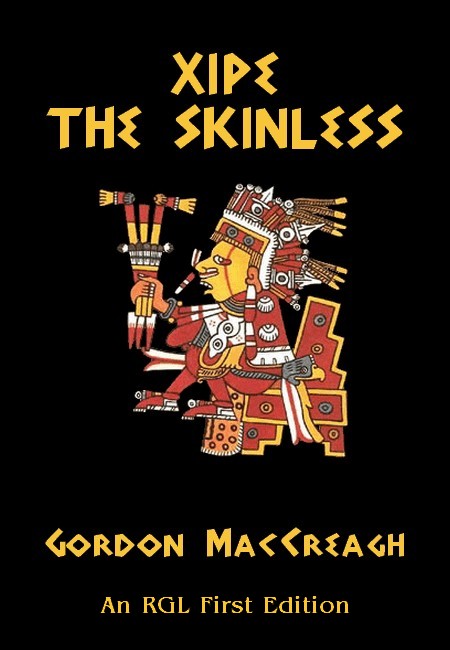
RGL e-Book Cover©
Roy Glashan's Library
Non sibi sed omnibus
Go to Home Page

RGL e-Book Cover©

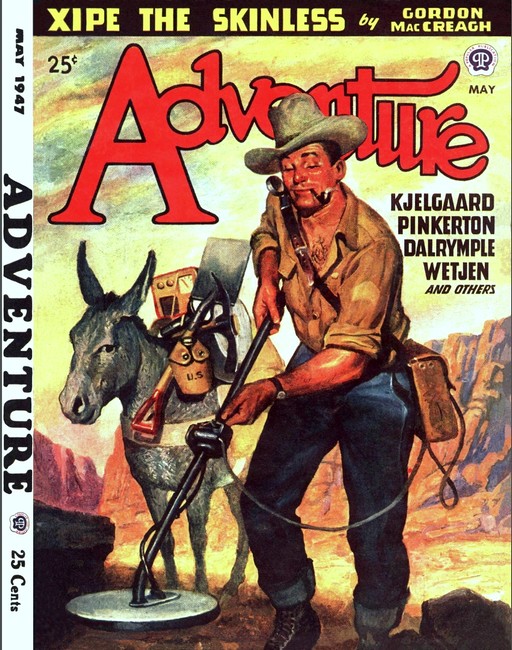
Adventure, May 1947, with "Xipe the Skinless"
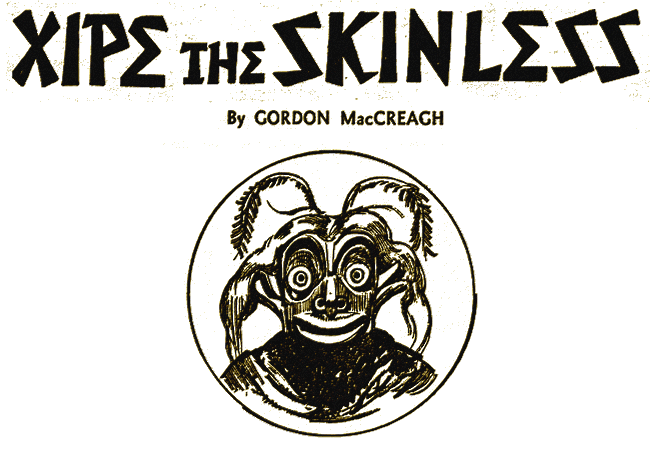
A HOT spot isn't just the place where I'd expect to be finding a highbrow, and in a boozy brawl, at that. Especially not in Las Tres Cruces in Mex City, that, in spite of its sanctimonious name, is a joint that peaceful oil drillers like me would just as soon not be found dead in. I had just gotten out of a uniform with a skin pretty well healed over in spots and all I was looking for was some of this peace that they told us we'd won. I went into this cantina muchacharia to see if Hype Agnew might be there and needing aid and comfort against the enemy, like Hype often is. Hype wasn't there; but this Professor Burton was, and certainly a babe in the woods full of wolves.
You know how those things happen. There's no sane people in the world will act as dumb as we Americans when we're a stranger some place and we suddenly hear a familiar North of the Rio Grande accent.
Anybody who's been around at all has seen it happen every second day or so—what was that old song about "It's great to meet a friend from your home town?" Nor it doesn't have to be the old home town either. Just let it be an American voice, and people'll fall on each other's neck.
We're plumb provincial in that way; we've never grown up like—well, look at the British, for example, in foreign countries. Oo-oof! You don't see them going around kissing Cockney accents.
So well, this Prof had happened up with some lads and they were just the wrong gang for him; they spoke American, yes, but not his language; and they had gotten him into this girl-and-tequila trap and I could see that somebody was going to get knifed pretty soon.
That's another trick we have that doesn't get us loved away from home. We take a couple at the bar and that's enough for us to tell the world in a loud voice how superior we do things back home, and we don't remember that half of the rest of the world understands English, even if it's coming pretty thick on the tongue; nor we never at all remember that every country has some words that they write in blood; words South of the Border like "Spiggoty" and "Greaser."
It was none of it any of my business; but these lads were shoving their new pal around and damned if one of them wasn't even frisking him; and the rest of the clientele looking on and I could read it like print on their faces what they were thinking: "Look how the Norteamericanos behave."
And a bunch of British tourists, slumming, bunched at the door, thinking just about the same thing.
So I jerked this poor sap loose and told him, "Brother, you're ready to go home to your hotel—if you can remember its name."

I SHOULD have known better. I did know better, but those things get right under my collar. Because I live here. I mean, I came back out of the Army to see if I couldn't get my old job back with Petroleos.
Sure enough one of the loud gang, the biggest of 'em of course, shoved close and wanted to know where the hell I thought I was butting in. And, well, there's just two ways of handling that situation. One is to argue about it and the other is the way Army taught us—to sock the opposition with all you've got and do it fast. I don't know how come those guys didn't know about it, or whether they'd stayed out of the Army in a safe foreign country—they talked Mex well enough to have done just that last, at that; and, like I said, all I was looking for was peace—but I responded to the G.I. training. I socked the guy with all I had and did it fast.
It blacked him out, but the rest of 'em came right over the top. Why not? I was alone. At least for a while—for long enough to get a few solid ones and see the lights dance—till a couple of the bartenders wanted in and a slummer tourist said, "I say, that's a bit too thick," and he pitched in on my side; and the stripper girls screeched and some of the natives who hadn't liked the word "Spiggoty" took a hand; and the war was pretty even. And then the cops came.
Don't let anybody ever tell you we can lick the Mex police just because we're Americanos. I left the tough gang to find that out. I got my little Prof by the arm and out the side door to the Calle General Maximiliano Villalongin (that's a lot narrower than its name) and I staggered him along—I mean, I was doing the staggering because somebody had crowned me with a three-legged table—along to the wide Calzada, and there came roaring a bus. One of those red things that are always packed like a box of matches and you jump for it and hang onto other people's clothes who are hanging on themselves and they curse you and help you hang.
We hung as far as I guessed was safe out of the fracas and jumped off at the Alameda—without paying any fares, of course; sweet chance a ticket taker has to shove through the mob to the doorway.
I shook my Prof till I could get my own breath back and I told him, "What you owe me, sap, is your roll and likely your life and a new suit of clothes. Now, Mister Damfool Señor, tell me where you live and I'll put you in a taxi and tell him where to go."
Of course, I hadn't known he was any professor up till then; I'd seen him as just a little guy, looking pretty lost and getting a going over from the kind of compatriot of mine that I don't like in a foreign country. But the minute he opened his mouth I knew he was honest-to-God long-hair and Harvard, at that. He said, "I am in your debt, Sir, for extricating me from what seems to have been a hazardous contretemps." Not that he talked that way all the time when I got to know more of him; but he was on the edge of sobering up and he had to be careful about saying things just right.
To cut a lot of palaver short, he told me what I'd guessed—that he was new in Mex and, more, he was actually looking for some Americanos who knew their way about and he had run into this gang; or, curiously enough, they seemed to have made a point of running into him and they had been friendly as all get out and led him to what they said was a nice little place where they could eat together—The Three Crosses, migod! And they gave him something to drink that they said was almost harmless—tequila!—and then he didn't know much more. But he knew he lived at the Reforma Hotel and nothing would suit but that I must come up to his room with him and he was sure we could do some business together.
The Reforma, let me tell you, means money with a hidden cover charge for breathing its air; and, well, I hadn't gotten as far as getting my old job back yet—so I went on up with him to hear him talk business.
I might have known. His story had long gray hair on it. He was an archaeologist and he had a lot of moth-eaten sheets of Aztec maguey paper that told him where there was a cache of treasure; a fabulous treasure, he said—if he'd translated the picture right.
I told him, "Brother, fourteen million people in Mexico have been digging for Aztec treasure ever since Cortez and they've got the land hand-sieved about three feet deep. That's why they raise such good fruit."
But you can't eradicate the bug out of a good treasure hunter any more'n you can malaria. He wasn't offended, he was just superior. He knew what he knew and he went cagey about it; he wouldn't hint where the millions lay, not till we'd get there—he had all the symptoms. But his imposition was acceptable to a man who hadn't as yet got a better job. I was to shepherd him along and fix for mules and grub and all that and generally carry on the good work of being his guardian angel.
So we shook on a deal.
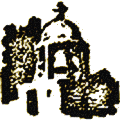
HIS name, he said, was Braden, Alvin G. Braden, with some degree letters after it, and that was sensible enough, even if he was going treasure hunting. He weighed around a hundred twenty and he had weak eyes—and, I found out later, guts too. I'm Diabhuid Donuil Tamms and I've always been sensible, even if my Dad was Scots and wasn't. He meant David—so the driller pals call me Dave, and sometimes D.D.T. I weigh into the hundred-eighty and there's nothing weaker about me than a driller can afford to have, only that I'm scared of getting into trouble—I've had all I need of it and I want peace.
So O.K., I asked the Prof where would he want me to have his expedition jump off and I'd go get organized, because what I've seen of treasure hunts they're always in the worst section of any country you care to name.
He said Papantla would be the jump-off; and I thought, oh-oh. Could just be that this lad had something more'n hallucinations. There's quite a piece of heavy jungle down that way and not so long ago they made a new discovery of an ancient pyramid there and I knew there were more that the scientific prowlers hadn't dug out yet. I know because I'd worked on an oil job by the Necaxa River and I'd hacked a little bit around the jungle edges with a machete and a gun. I tried Alvin G. out. I told him, "D'you know that the Indios down there are Totonacs, and they don't believe such a much of what the Padres tell 'em, preferring their old tlenamacac wizards, and they'd rather everybody would stay away, and some of 'em got blue eyes—which the scientific sharps don't know how come and, come their Xipe fiestas—that's the one for whom the old-timers used to flay their prisoners before ripping their hearts out with a jagged obsidian knife—they won't let strangers come fooling around their villages."
He didn't even hear that last. His eyes popped and he grabbed me by the arm. "Blue eyes!" he yapped. "You've seen them?"
Sure I had; and their color was quite pale, almost red-checked; good lookers, some of the women. The Prof breathed like he was having a revelation. "Evidence again," he said, "of Churchward's theory of Lemurian migration before it sank."
I didn't know what he was talking about. Then he deflated as he had steamed up. "Interesting," he said. "Astounding. But after all, not my subject. I'm alone in this."
And did that leave me flat! For a minute I thought I'd given him a lead to his buried hoard; but those highbrows can get excited about practically anything that has no profit to it as long as it's old.
"Alone," he said. I asked him what did he mean, alone? Wasn't there at least a collegeful of grave robbers who'd studied over those same maguey fibers?
"Oh yes," he said. "Why certainly. It's only that I disagree with De Peña's accepted translation of the glyphs."
And on the strength of that, of a quibble about what a curlicue meant, he was going treasure hunting! But a thought was beginning to itch. "Those good pals," I said, "who were frisking you. What d'you figure made them so all-fired interesting in picking exactly you up and spending their money on high-priced drinks in a muchacharia joint?"
He had no idea; it didn't even bother him. His reading of the curlicues was his own; he hadn't argued his theories with more than a dozen or so professors at any time, and they, of course wouldn't stoop to liquoring a colleague up and having his pockets picked. It must have been because the gang thought he might have some money about him.
I said, "Yeah? And how many students have those colleagues lectured to? No, you don't look to me like any rich playboy to draw the time and cash outlay of experienced tourist-clippers. And what's more, the little I've ever heard about archaeologists, they'd steal the Queen of Sheba's false teeth from their favorite blind kid sister and lock 'em up in a glass case so long as they were old enough to be chipped around the biting edge; and if there was any real buried treasure involved, well, that lets in one or two other people I could think of."
He said stiffly, "Mr. Tamms, I'm afraid your associations in life have left you rather suspicious of your fellow man."
Could be, I was willing to agree; because a man who's knocked around amongst the horny-handed sons of toil doesn't get so he takes them all for holy men. I decided, if I wanted a peaceful treasure hunt, I'd better go back to that creeper joint and spend a peso or two asking questions about the customers.
But I drew a clear blank. The gang was new, they swore; tourists just arrived, and most of them were in jail anyhow for some rough work during the fight.
It must have been pretty rough, I figured, for the Mex cops to go to the trouble of jailing them instead of just knocking them cold and throwing them out. But they must have been new, at that, although they talked Spanish, not to know about that side door. Nothing I could do, though. If the joint didn't know, I was sure those tough birds wouldn't tell me any secrets through the jail bars.
I went on down to Papantla to collect some porter peons; mules would never squeeze a mile through that kind of jungle. And in a couple of days I sent word to the Prof to pack his mosquito net and atabrine and come along.
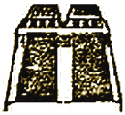
HE WAS there in a couple more days, and I tried him out again. I took him to an outhouse hotel where if you know about it, the bricks are loose in the side wall so you can softly pick one out and peek what the girl in the next room may be doing. Not that I had much choice about it; the village doesn't rate any Sutler or Ritz. He never batted an eye. All he said as he looked over the mess was, "What is all the armament for?"
I didn't want to ride him; I said I was just a guy who always went treasure hunting with enough moral persuasion to keep the coyotes off nights. He asked, all wide-eyed innocent, whether I expected trouble. I told him flat, no; because I didn't believe there was any hidden loot left in Mexico; but if there was I'd bet a pack of bootleg brass shells trouble would come nosing it out like zopilote buzzards.
He just said, indeed, and would we be ready to start tomorrow? And I said, "Sure, where to?" And you could have blown me down.
He didn't know! He said we'd have to go in and ask around.
I said, "Lordamighty, are you telling me all the plans you've got is to machete a way into those jungles and ask the local peasantry where there's a pile of their sacred gew-gaws that even the Conquistadores couldn't twist out of 'em?"
He said quite simply, yes, that was it. Nobody else knew about this cache; only his reading of the pictures made it out that there was an ancient temple back in the woods.
And on the strength of that much he was going treasure hunting! I thought, hell, a wildcat well drills on better evidence; but who was I to argue against Harvard? So we loaded up the Indio porters and I took him first to El Tajin.
That's the newest pyramid they've found and enough excited científicos have tramped around there so there's a path; and they're still arguing whether it was dedicated to Zotzilaha Chimalman, the bat god of darkness whose job it was to destroy everything, or to Ipalneomohuani, the sun god who gave life. The names those old Mayas thought up! It just goes to show how much the studious boys know about it all. Only thing they agreed about was that it was one of the oldest buildings in all America and that there must be more of the same somewhere back in the jungle. So that was one up for my professor.
This Tajin has four sides, each exactly facing the four compass points, and 91 altar niches in each, adding up to 364, plus 1 for the top; which proves that the builders knew a lot more about astronomy—and I couldn't forget astrology and such wizardries—than ever the Egyptian priests did. To me it made no difference; I'd climbed up to the top and there was the usual old hollow in the rock to collect the blood and a channel to drain some of it off when it got too full. They've got one in the Museo Nacional—a "sacrificial stone" they call it. Those old-timers didn't care to whom they sacrificed their prisoners so long as there was blood. It was a creepy thought up and down my back hairs that nobody knew exactly what the religion of these Totonacs was today nor what they had of left-overs from the way back days.
Prof Alvin G. Braden never seemed to have any squeamish ideas. He prowled all over that pyramid and wasted half a day on it and got nothing. We'd have to go on, he said. So we made about a day's crawl along what might have been a coyote trail to an old mound that must have been older even than the Tajin, for it was just a pile of rubble. And then suddenly we were surrounded by a dozen or so Indios and all of them had machetes a yard long!
Our porteros just grinned and I could bet they'd known all along that this was the end of the road. They grunted the sounds that are Totonac and then they told us, "Prohibido el pasaje"—Passage forbidden!
And then it came to me. One of those weird ceremonies of theirs was coming due. The Fiesta of the Voladores, the Flying Men, and that's another something that the científicos don't know the why about, but the Totonacs swarm in from their inner jungles and pull it off every year slam in front of the church, and the padres have been tipped by the government to lay off or there'd be an Indian uprising.
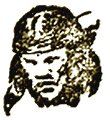
THE PROF let out a yipe. Not because of the freely-handled machetes, but because one of those ruffians had blue eyes! As way back a savage as any you'd find, and he looked doped, sort of hypnotized like—deadpan, with his eyes wide, and while he looked at you you knew he wasn't seeing you. You know what I mean, like a zombie or something. All he wore was a maguey cloth skirt and his hair was a pure crow's nest, but his hide might almost have been a well-baked Coney Island lifeguard. Of course my theory always was that some strong-blooded old conquistador hadn't given a hoot about the Mann act when Cortez came storming up from Vera Cruz. But my Prof went farther back; he yipped about migration from Lemuria again and he jumped for this near-blond to peer into his eyes and turn him about and generally handle him like a museum piece.
The others set up a yammer like it was sacrilege and one of 'em stood clear and made to take a swing at the Prof that would have split him in two; but I shoved a shotgun up against his belly—I never fool with anything so uncertain as solid ball in close jungle—and the situation froze.
The Prof didn't even know about it. He was gibbering words and pointing at the rubble pile. I don't know what they were; not American, nor Spanish; they were noises like some of those twisted mouthfuls of ancient gods' names. The Indios gawped at him like he was miracles happening and their tough scowls turned to look less like fight; and then you could have rocked me again with a breath. Damned if he wasn't talking Maya!
He didn't know Spanish, this Harvard highbrow, like everybody else—but Maya! What I mean, he wasn't conversing or anything like that; but he knew scraps of some of those words five thousands years old or whatever, and of course I'd heard that some Maya had come through to the Totonac talk.
The Indios gawped and some of them slid into the jungle and in a little while they were back with a man who looked like a hundred and thirty years old and wore a red mask with a jaguar's skull as a head-dress, and my stomach heaved up to where I could taste it. As a driller I'd turned up enough old stones to know that that outfit represented Xipe, the god who had no skin and so he liked to have his prisoners of war flayed alive before he ate their hearts all steaming hot. I didn't know what this old tlenemacac was play-acting, but I swung my shotgun over to let him see sense in being reasonable. But the Prof gibbered his magic words and the medicine man gibbered them back with a better pronunciation and I don't know what all the two of 'em made out of it; but presently the wizard coughed at his strong-arm boys and they edged back into the jungle like dogs, watching us all the time, their lips quivering, and the old man adopted the Prof right there. He took him by the arm and led him around a corner of the rock pile and scrabbled away some dirt and showed him a stone, and the Prof went all the way batty.
Like the stone. It was carved with the figure of a man flying with skins stretched over bamboo spreaders like a bat. If the Tajin was a mere five-thousand-year baby and this was older it meant that some brainy lad had been civilized enough to think about flying long before the Wrights. The Prof wanted to pry the slab loose and he babbled about a priceless find and the Harvard museum must have it.
I told him, "Migod, man! You can't loot antiques that way. Those good old days have gone. Antiguos belong to the Mex Government. But if your museum has any rating and you can pull official strings they may let you find a millionaire angel to buy it for you."
His shirt stiffened right up and he made that crack again about the kind of people I must have associated with, as though folks who worked for a living ought to know what kind of rating his college collection of potsherds had, and he capped it with, "But nobody knows we've found it."
As though that squared everything. I'd already told him what I thought about an archaeologist's conscience and here was just one more proof. Not that I thought it any sacrilege to lift an old carved rock, but I wasn't laying myself open to a Mex jail for thieving the people's antique culture.
But the wizard settled the whole thing. He just covered up his rock again and grunted at our porteros and they told us he said that we'd have to go back, and when this Fiesta of Flying Men was all over we might come again and perhaps he'd let us through, depending whether anybody got killed at the fiesta. I didn't know what that could have to do with it; but I knew damn well, if we did come back, that carved rock wouldn't be there. It meant something to those Totonacs.
The Prof just about cried; but I could hear those machete men rustling around behind the lianas and I took and shoved him along the way we'd come and he babbled about practically having proof now of his interpretation of the old maguey pictures and about Lemurian culture and another old unfound pyramid and what all.
What I knew about lemurs was they were a kind of nocturnal monkeys with big eyes and long fuzzy tails and they wailed in the banana tops like ghosts. But he said, "Don't be stupid. Lemuria, the Pacific continent that sank some ten thousand years ago. Muria, Muya, Maya, don't you see?"
I asked, migod, did he believe in those yarns, like Atlantis and all that? and he wouldn't commit himself; he said, oh he didn't know, but there were quite a few students of history before its beginning who argued that there were traces of some such lost civilization on both sides of the Pacific; and then he shook it from him like it was of no importance. "It is not my subject," he said again. "The important thing is that their stopping us argues there is something farther in the jungle and if it's Maya we know that the flayed god was a son of the bat god of the night and they made splendid offerings of—" and right there, as he was on the edge of spilling some information about what was his own subject that he'd brought me here for, he switched. "And from where do you think the name, lemurs, came to your monkeys anyhow?"
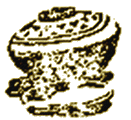
THE devil an' all I should know about such riddles. He went on, half talking to himself. "And if I have impressed that old priest that I'm not just an idle tourist, or a robber, or something and we can go on through—"
What did he mean, priest, I butted in. "That old crow is a sure 'nough tlenemacac, a medicine-man hereditary pyramid warden from away back like the padres like to say there aren't any more; but you've seen him and your bits of ancient lingo have horned us into something that makes my skin creep."
He said in his professorial tone, "Really, Dave, you're positively naive. All priests of ancient times were medicine men, for the simple reason that they had the knowledge of the mysteries. It is only amongst the modern Christian people that they have lost it and don't know any more than you." And he added to that, "Or rather, let me say, even than I."
That's what an ordinary guy gets when he hob-nobs with the higher education. I had to cut him down to my size. I reminded him, "And what do you mean, you're not a robber? Heck, man, what have you come for? Even our Uncle Sam claims that treasure trove is half of it his."
He wouldn't say. I guess we weren't deep enough into the woods so he could be sure I mightn't spill the beans to some other archaeologist. Deep enough for me, though. What I wanted was a peaceful life, and though my skin was pretty crudely patched by a young Army doc who was strictly practicing, I still liked it well enough not to be begging permission from any priest of Xipe to go shoving into the tall timber where there might be another old temple with no police protection.
I told him all that and what did he think Papa Zotzilaha Chimalman and Son Xipe would think about a Christian Harvard man coming to swipe their ancient boodle and was it "splendid offerings" enough to make it worth while
He suddenly blazed with enthusiasm. "If it's what I think," he said, "it's fabulous." And then he dropped out of it "Well, it seems that if anybody gets killed at this fiesta we won't be allowed to go anywhere."
I hoped a fair dozen of somebodies would get killed at the fiesta.
They didn't. Only one did; though the way they pulled off their stunt, I'm surprised it wasn't more. This fiesta thing, to cut a lot of talk, was a repeat act of that old idea of flying. A gang of Indios danced—and right on the front steps of the church. They were dressed up in red and green with macaw feather plumes. Four of them were the pale-skinned kind and absolute deadpan, zombies like the one back in the jungle. They were sacred too; none of the others must touch them. They shuffled around and a masked guy hopped amongst them like a referee and kept whispering at them; not our jungle mummy; this one had a brown mask and he didn't rate so high, he had no jaguar skull. Another man with a drum and a reed pipe was allowed to hop close to them. Out front they had rigged a pole, a whole hundred-foot tree. They were going to "fly" from its top.
The government had sent down a científico to take it all in. He wasn't an archaeologist; he didn't care what people had done five thousand years ago; he was an ethnologist, he was interested in what they did now. He was reeling off movie film by the mile. The gang danced for hours—they always do at all fiestas.

I STROLLED around the crowd a spell, and I saw something I didn't like at all. They were a pair of unmistakable Americanos, dressed in the worst tourist style. I think I've said I'm a man who isn't looking for any fuss, but I had to know. I went up to them and said, "Hello, punks. How did you get out of the hoosegow?"
That's exactly what they were, big town toughies. They started, like caught in the act, and the rattier of them sniped, "What the hell d'you know about any hoosegow?" and then he recognized me. "Oho! You're the smart guy who horned in on our party at the Three Crosses. Well, Buttinski, we were smart enough not to get into the cooler. As smart as you, see. And that's something it won't hurt you to remember."
I said, "I never got to college to train my memory. And what all are you doing at a li'l old native fiesta? Improving the minds you haven't got?"
I could see the other punk's fingers curl, like he'd like to have 'em round the butt of a gun, and I could see the lump under his left armpit. He covered his itch with surliness. He said, "We're tourists. And who the hell're you to come asking free American citizens what they're doing?"
I took the two of 'em by their lapels to pull 'em close and whispered it portentous. I said, "Listen—and it'll be nice for you to remember. I'm Shotgun Dave. Sawed-off Shotgun Davie; and I can shoot a man's teeth out at ten-foot range from behind any jungle bush." So then I slapped 'em a good one apiece over their ears to see if they were remembering and I took care to crowd too close for any monkey-play with that gun. They remembered all right and I left it with them to mull over. I sure as hell did not like any of it. The same crowd that was frisking the Prof. What interest did they have in folklore and such? And I supposed they'd be smart enough to wangle their pals out of Mex City jail presently too.
I went to tell Mr. Alvin G. Braden. He was talking to the ethnologist of the Gobierno. That one was lecturing, "We don't know why they do it, nor just what its significance is. We know they've done it for a long time because Bernal Diaz del Castillo reports it from as far back as the Cortez invasion."
I said, "Heck, mister, it's way older than that. Why, we've seen a—And right there Professor Alvin G. Braden of Harvard ground his heel rasping down my ankle none just like any common bar-room horse tout. He said, "We saw a glyph in the museum that seems to indicate some such ceremony as pre-Colombian."
Yes, the Gobierno man knew about that, but they weren't exactly sure what it meant, and Bernal's was the first written description, and so he went on, "We know it has some sort of astronomical and religious connection, and that the risk they take signifies sacrifice. It is definitely a hang-over from some stubborn pre-Christian cult; otherwise why do they insist on flaunting it at the church door? It is quite obvious that those four bedrugged, or hypnotized, devotees who are going to fly are especially chosen initiates of the ancient cult."
My Prof asked, "Does Banisteria caapi grow in these parts?"
The ethno nodded. "We have not discovered any of those extraordinary telepatina rites here, but it could account for the apparent hypnosis."
It was all over my head, but I could get the next all right.
"And we know that if anything happens to them, if any disaster occurs during the ceremony, as for instance, one of them getting killed, it is a sign that their god is dissatisfied about something and it will be a bad year for them—unless they propitiate him with whatever other sacrifice he needs."
That was cheerful remembering a little later when the disaster did happen. What they did was, the man in the mask suddenly decided they'd danced long enough to call the attention of this man-eating god and he made the high sign and immediately the four dopes and the musician shinned up their mast with long maguey fiber ropes, and mighty thin they looked to me. Up top was a head no bigger than any mast head; I'll swear it wasn't more'n a foot square; and right below it a spidery little perch. The dopes perched on the perch, like birds—the ethnologist said their costumes represented Kinnich Kakmo, the fire bird. Then the musician pulled a stunt that would have turned any pole-sitter green. Damned if he didn't stand up on that square foot of board a hundred feet up in the air and dance! And tootle his flute and bop his drum at the same time! And presently the masked man yipped again and the dopes immediately threw themselves off their perch and started swinging around the pole on their ropes. Flying. Turning and diving like birds—far out and around, like a Coney Island airplane ride that does it with steel cables.
Thirteen turns they'd have to make, the Gobierno man said, and four men by thirteen multiplied out to fifty-two, which was the period of the Maya century and proved something or other. Zopilote buzzards came out of the blue nowhere and planed around to watch hopefully. And they were damnably right. One of the ropes broke, of course, and the flying dope was slung clear over a rooftop to crash on the cobbles in the next street!
The crowd of Totonac Indios who'd been holding their breath like I had mine set up a yowling and groveled and beat their heads on the stones. The rest of the village up and rushed around the block to gawp at the accident just as fast as any Americano crowd. The musician way up there broke his drum and smashed his pipe and threw them down; and as the pieces hit ground all the Totonacs quit their wailing and froze to the floor and the sun boiled down on a sudden graveyard silence. Nothing moved—only from up above came the thin swish of the other three flyers sailing through the air.
The Prof spoke, tight in the throat but determined as a hardrock drill. He said, "That means the Xipe wizard won't let us through at the Tajin. We'll have to find another way around."
I said, "My God! Still?"
The Gobierno ethnologist said, "Why around to where?"
The Prof said nothing.
I said, "Let's get outa here."
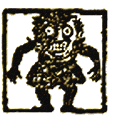
WE GOT out. There was nothing to stop us, nobody in the streets. Men, women and kids were all milling around the dead initiate of whatever it was who proved that their god was mad at them and would be wanting more sacrifice.
Back in the sweaty old hotel room I tried to reason with the Prof. But all he would say, as stiff as a drill-rod, was, "You are a free agent, Mr. Tamms. If you are afraid to go through with it I shall have to find somebody else."
I told him, "Yeah, and I know exactly where you can find two hard little potatoes who I'll bet are just as interested as you are to go wherever you are going treasure hunting."
That shook him for just a moment and he had to know what I meant. I told him about the two punks, and the way I sized them up they were as smart as they said, and they knew their way around enough to buy the rest of their gang out of the clink before too long—and then he'd have a real escort to fight through a whole lot of opposition.
He pursed up his lips—I'd never seen before how tight he could make them. He mulled it over, then he stuck by his guns. "I can't believe that any of my colleagues would try to follow me—even if they knew. But if somebody else may have got some sort of an inkling and hired, as you might say, claim jumpers, it just means that I shall have to hurry before they get free. I had hoped I could say, we shall have to hurry, but—" He shrugged disappointment. "Somehow I had judged you differently, Dave."
As clever as an old hand gang boss when the jinx hits the boring gear. I wanted none of it. I wanted peace. But when he put it that way—
I damned him and all I could say was, "Well, I haven't ever quit on a contract yet and I never thought a Harvard professor could be that crazy. But since you're so sure I'm sillier than you, O.K., we'll get up and git now and we'll see if we can cut in back of Tajin by the Necaxa River."
He grinned like he'd won a school debate and said, "Good boy, Dave." and he had to shake hands on it, like a new deal. We told it around that we'd seen the show we came to see and we were going home. We made a big show of hiring an old broken-down car and piled in our gear and we even shook hands with the hotel proprietor—whom we ought better to have killed—and we roared and bucketed off on the home trail.
And at the Necaxa the Prof paid the driver to go on to Mexico City for a vacation and stay drunk for a month and we bought a dugout canoe, as big as a matchbox and about as fragile, from a chicle hunter and went on. "And that," I said, "ought to shake the bloodhounds off of our trail."
I didn't know where to go any more'n he did; only, since the Xipe wizard had stopped us back of Tajin, it was good guessing that the direction would be that way. It took trigonometry to figure out how far to follow the Necaxa windings and then where to head by compass. Even the Prof didn't know any of that; he was an archaeologist, he growled, not a dry and dusty mathematician. I didn't know which of the two was dustier. So we quit our canoe when it quit us; when our skin was crinkled white from sitting hip-deep in water and bailing took so much time we made no progress. We hauled out at a village; what I mean, four chiclero huts on the bank. Chicle hunters don't live long, the kind of jungle they have to live in; so we could strike a bargain with four half-dead ones to carry our gear for us, for enough money so they could retire; nearly ten bucks apiece, and they insisted they'd have to have it in advance.
I asked the Prof, "D'you know what that means?"
He didn't. So I told him. "Means they think it's a fair bet we won't be coming back."
It was my last feeble chance to call it all off, but I couldn't discourage him. He said, "That's because the poor devils don't know about all the new medicines the Army developed for jungle work."
That man could shut his eyes to what he didn't want to know just as tight as any other schoolteacher. Where to head in was anybody's guess. The chicleros didn't know where any pyramids grew that nobody had yet found; but they had their trails that they'd hacked hither and yon, hunting for their trees; and a chiclero trail let me tell you if you don't know it, is no avenue that you stroll through standing up; you do it on your hands and knees and your belly. You make half a dozen kilometers a day and by the end of the first one you know why they are half dead.
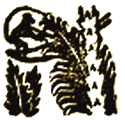
THE rainy season was in its full middle, meaning that forenoons the sun made a Turkish steam room below the tree tops that you could never see—and afternoons, when those thick tropic drops pelted down, you swam. Even the monkeys quit that country in the rainy season on account of the mosquitoes that shoved 'em off their trees and ate 'em raw in the underbrush. Yes, we had head nets and cotton gloves and all the rest of the comforts that the Army thought it discovered for jungle work—though why the brass boys in Washington hadn't just asked some old oil explorer and saved a year's time, I don't know; and why the hell anybody would choose that country to build temples in was something else I didn't know.
The Prof said, muffled through the million different bugs that blanketed his head net, "There is considerable ground for the theory that climatic changes were the reason for the otherwise unaccountable disappearance of those old civilizations." And he could find his note of good cheer, "Which is all to our advantage, since that is why nobody has explored these jungles."
"Because they don't know how much treasure is buried in 'em, I suppose," I said. "Only you know, and thats mighty thin encouragement to me."
And he said, "Yes, I'm almost sure now that I know." Which was still a damn sight less encouragement than folks have who go treasure hunting on a phony map drawn on a pirate's shirt tail who never had any shirt.
Nights we slept in hammocks, of course, slung high so mud-fish and whatnot wouldn't nibble at us; what I mean is, we lay in hammocks and when we were so beaten dog-tired from crawling in the wet that we wondered how chicleros ever lived a year we sometimes half slept. So that's how I heard it. I hissed at the Prof and he was full awake in a second and I gave him the good news. I said: "There's a whole lot of something shuffling about ahead of this 'gator run we've been following, and it isn't animals."
He didn't have to guess what I meant.
"So you think, we're headed off again?"
"Damn tootin'." And I didn't care if he heard me chuckle. "And I can find my way back to our luxury canoe blindfolded and one foot tied to a stump. But how the devil an' all they located us here beats me. I know nobody followed us out of Papantla and even bloodhounds couldn't have trailed us downriver."
"I wonder," he said. "I wonder if it could be anything so extraordinary interesting as the telepatina."
And I said, "Yeah, I wonder. You talked about it with the other educated guy and I'm still wondering."
So he lectured. "It's an infernal nuisance, though a first-hand investigation of it would almost be worth while the time we lose finding another way through." You couldn't down that guy's stick-to-it-iveness after his loot; I wondered what Army outfit he'd served with. "You remember," he said, "I asked the ethnologist whether Banisteria caapi was found in these parts Well, it is a plant with some very curious drug properties. It was first discovered in Brazil by an explorer by the name of MacCreagh, who reported some hypnotic and anaesthetic properties. Later Dr. Rafael Bayon investigated it in Colombia and wrote a very learned monograph about it in which he insisted that he had witnessed more than one instance of telepathy under its influence, even to the extent of their curacas, or medicine men, showing evidence of receiving accurate news of distant events in visions."
I said, "And Harvard can swallow that?"
It always got under his collar when I said anything about Harvard. He said, "There is nothing so humorous about it as the ignorant laity might think. A whole library of serious literature attests similar evidence found among primitive peoples, especially among African witch doctors. Hitherto, it has not been reported here. An investigation at first-hand will be most valuable."
Well, maybe he was right. Maybe these uneducated primitive peoples got it like Dunninger—or who's the guy who does it on the radio? Or maybe it was just that; something as simple as little radio sets built into their brains. But we were both good and gruesomely wrong. I mean, about us being headed off.
Come morning there was a crowd of Indios all around us, about fifty of 'em, all with those yard-long machetes—and they weren't politely turning us back, they were taking us along with them!
Oh yes, we had our guns; shotguns, like I said. But it's only in movies that two intrepid white men can fight their way through fifty Indians in close jungle that grows up around your ears. We hadn't seen a movie in months; so we didn't have any wrong ideas about how many foreigners two good Americans could lick. The Indios gabbled at our chicleros and those hard-working boys didn't even ask for a tip. They said what must have amounted to "Thank you, kind sirs," and they skittered back into their jungle trails without a regretful look. A voice of authority coughed some twisty-jawed Totonac out of the bush scenery; some of the Indios hoisted our gear and some more of them told us in machete language that didn't have to be translated, to get going. We went peaceable.
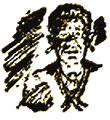
THEY were Totonacs, of course—though all the Totonacs I'd seen up till then were city slickers who came in to make fiesta dressed in white dungarees. But you could tell by their Mayan beaks and their good looks if not by their clothes; for all the clothes this gang wore was breech clouts and their pale hides looked all the paler for a million little scars left by thorns as they shoved through the cat-claw lianas like tapirs. "Pachyderms," the Prof said.
There was one good angle to it, though. We didn't have to hack trail; they did it and we could toddle along practically upright, as good as monkeys anyhow. And they fed us—lye-softened corn tortillas and red hot meat that could have been monkey, and then again could have just as well been dog that's easier to catch; and of course cocoa with sticks of vanilla orchid pods to stir it with. Stuff to stick to your ribs, so I knew there was some hard going ahead and they wanted us to get there alive. I had my qualms wondering why.
The Indios were polite enough; I mean they didn't prod us with knives or knock us silly with clubs, like those scalp-tingling yarns about our own old-time Indian troubles. Authority halooed orders from ahead and we halted or twisted whatever way he said. A few days of that was as much as my nerve could stand—just scrabbling along through dim wet jungle, knowing nothing of where or why. I tried to talk to our nearest machetero guards and I knew damn well from their knowing looks that some of them could understand enough Spanish; but they just put on their owlish expressions and shook their heads. But they passed the word to the one in command up the line and, come afternoon cocoa snack about ten days along, His Nibs dropped around to call. And I got a cold jitter through my sweat.
The guy was masked! In shiny tin this time—and not with a jaguar skull on top—with a pink spoonbill's skin and long beak.
And why, you'll want to know, should a pretty water bird give me a qualm? Because that was Xipe again. Xipe had another hat too, the blue cotinga; I knew they represented Earth, Heaven and Hell, but just when he meant Hell I didn't know. The Prof didn't know either, but he was ready to lecture heathenishly:
"The concept of a Trinity, my dear Dave, is no Christian prerogative. It has been found in all early religions in all countries; a fact that offers some most interesting speculations for those who are interested in the evolution of religions; which; however, is not my subject. This man is obviously a priest again of whatever cult it is that has survived amongst these people."
I'd never had much dealings with priests at any time and the more I learned about those with ancient Mayan cults the less I liked 'em.
This one didn't mind talking; he said we were going to the "Place of the Old Ones" and that was as much as he would say. The Prof quivered like he'd been told we were going home for Christmas.
"He can mean nothing other than that they're taking us to my pyramid. Surely it can be nothing else."
I said, "Yeah. But why are they taking us?" His pyramid, he was calling it already. What I was wondering was, was it his, or Xipe's?
He said, "And do you know, my good pessimist, why his mask doesn't rust? Because it isn't tin, it's silver."
"So what?" I said. "I'm poor at sums, but I know that all the silver one man can dig up and carry away any fine night that he escapes from a gang of machete cultists amounts to about fifteen hundred bucks' worth; which is pretty poor treasure hunting."
He said he wasn't interested in silver. "So then what?" I asked him again. What was this "priceless" loot he was after that couldn't let him think about anything else connected with bloody old Mayan pyramids? And that sent him all dreamy-eyed again. "I'll tell yon," he said, "if they do take us to a pyramid—I mean, to my pyramid of which I think I have deciphered the correct translation from the glyphs."
"I suppose you'll scream it to me," I said, "as a last minute item of good news just before they rip you under the fifth rib with an obsidian knife and drag out your pulsing heart and shout, 'Heil, Papa Zotzilaha Chimalmam and his raw red Son Xipe!'"
Sure I was pessimistic. Mexico is a civilized country—at least, in most of its spots. Indios don't snatch white folks and take them away into the backwoods unless they're pretty damn stubborn and got secrets, and what I know about primitive people's secrets, they're as nasty as Nazi. The Prof had nary a doubt; he had come to dig into a secret loot and here we were in secrets up to our necks; so the way he figured it, he was right on his way to "something fabulous." How he was going to get away with it, he seemed to be leaving up to me that he'd hired as his trouble-shooter. Well, I'd be glad if we'd just get away with our skins and back to a peaceful life.
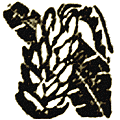
WE CRAWLED along that way, in mental darkness as dim as the thick woods, doing our good four or five miles a day, for ... I don't know, I lost count. The silver-faced wizard every now and then pulled a queer stunt and he was so sure of things, he didn't care who looked on. What he'd do was pull off a little ways from the camp-fires—I should say, the camp smokes—and he'd drink something out of a gourd, bowing to the four bacabs—that's the little gods of the four compass points. Then he'd settle himself and begin calling on the name of Tezcatlipoca, intoning it sort of like a bell. Tez was the god who rushed around on the four winds of the bacabs and so he knew everything that was going on everywhere. If we had him, he'd be the god of Associated Press.
So the wizard would call Tezcatlipoca and take another slug out of his gourd and then call him again; and presently he'd begin to get glassy-eyed and dopey—which was no more that I'd expect, taking it raw like that. But the Prof got all steamed up about it.
"Good Lord!" he said. "That must be the iage or caapi! We are seeing the fantastic thing happen before our eyes."
I don't know whether it was honest magic or just some of the hocus-pocus those fellows have to do to impress the peasantry. But in a little while the wizard would drink himself cock-eyed and mutter himself plumb hypnotized. Like those dopes who flew, though not so deadpan dumb. His eyes would remain wide and he'd cock his head like listening and then his lips would move like talking hack.
"It is the telepatina," the Prof whispered. "Just as Doctor Bayon described it. He is talking to an attuned mind; or perhaps to the tagepai, the visionary midgets who carry messages."
A funny thing about education up to the eyebrows is that you know so much you can believe anything can happen—or nothing. Not that I don't have an open mind; I can swallow anything anybody'll show me, but no visionary midgets. Anyhow, in about half an hour the wizard would groan out of his binge and he'd have all the news. Some of our machete guards were talking to us now and they'd say, "He has been consulting with the One Who Orders." Which was easy enough for any priest to tell his true believers and so long as he didn't guess wrong too often his stock would hold good. But one time after he'd gone through his act they told us: "He says that the Mexicatl Teohuatzin has ordered another party of nine men to meet us and then we must turn east."
That meant the very boss high priest, and in the good old days he was the lad who threw his trance and had a revelation about the date the gods wanted for the next sacrifice of prisoners and how many hundred of 'em. Maybe a name as powerful as all that had some authority over the iagepai midget telegraph messengers, for damned if it didn't click!
Two days farther on there was a halloo from over to our left and a party of exactly nine men sloshed through the woods to join us, and who was one of them but our mummy of the Tajin with the jaguar hat!
He went through a set of high signs with Spoonbill, which, if I knew anything about it, I'd say they were Masonic; and then he came over to the Prof and said, "I warned you."
I couldn't see his expression, of course. But I sure didn't like that word, warned. It sounded too like we'd stuck our face into something nasty and it was nobody's fault but our own. But it never fazed the Prof, even if it soaked in. Nothing would suit him but he must try out that caapi drink. Spoonbill's voice that we couldn't see through his silver mask chuckled. He said, "It will make you very sick, for the iage requires an apprenticeship of many years. But you arc a student of the ancient mysteries, so you will doubtless consider the experience worth while." Anybody who was interested in their ancient mysteries they considered tops.
They had him sit apart and they gave him a couple of nips, no more; and they were right with some to spare. The Prof was as sick as I've ever seen a poisoned dog. So sick, it left him dizzy—maybe dopey, I don't know. Anyhow he went dreamy-eyed. When he came out of it he said he hadn't heard any news, but he was a whole lot pepped up.
"I am experiencing an extraordinary exhilaration, an uplift beyond all mundane worries. And as a matter of fact, that is what MacCreagh reported of the Amazon Tucana tribes. They called this caapi the 'drink that makes men brave' and they made use of it in a ritual of defying the evil spirits of the jungle. And true enough, I feel that I am afraid of nothing. I am care-free of whatever may befall."
I told him, "Yeah, I've seen it happen to people from something mixed by a wizard of a barkeep."
He laughed at me; he was sure having none of my worries about what we were heading into. Not even as he handed me the exact cause of them. "And don't you see, my obtuse friend, it is probably this caapi that accounts for the intrepidity of those flying men as they went into their dangerous ritual; and also, no doubt"—this was what got me—"for the apparently hypnotized calmness, as Bernal Diaz points out, of victims who went unresisting up the pyramid steps to certain sacrifice."
He was so pepped he didn't even know he'd said a mouthful. I was remembering what the other sabio, the ethnologist, had said about somebody needing some more sacrifice if anybody should get killed at the flying pole fiesta: and I had my own theory about why our jailers were being so all-fired polite to us too. I told the Prof about it later, when he wasn't so hooched up he couldn't think, and, by golly, that gave him the first jolt I'd seen him take.
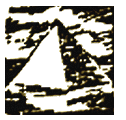
A FEW days later the wizards went into their caapi trance and gave out a press bulletin that we'd pick up another gang day after tomorrow afternoon. With both of 'em on the beam it ought to click, and it did. Half a dozen men and two women joined in; it looked like a gathering of the clans for Christmas turkey. One of the women would have passed for a beach brunette and had a figure that would have got her into the final judging in any bathing beauty contest; and she dressed the part too—just the lower part, in a maguey cloth apron.
Even the Prof took notice. But what he said was, "You will observe that these women are no subservient slaves to their lord and master men; they seem to be on a basis of equality. There is no doubt in my mind that these people arc some remnant of a superior civilization."
"Sure," I said. "Maya—Muya—Lemuria. Like your Churchward wrote; and if the women have so much say-so maybe one of us could work up a Pocahontas act and have her save our neck."
"Why not?" he said. "Why don't you try?"
Which I didn't mind trying. I sloshed alongside of the prize-winner and started to pour out the fatal charm, and what scared me again was that nobody chased me—they acted like I was a hungry G.I. and the world owed her to me.
So well, we slogged along that way, as determined as mud turtles, till I figured we must be getting into Guatemala at least, if not Panama. And then one day the boys told us, "Tomorrow we arrive."
"Where?" I asked.
"At the Place of the Teocalli," they said.
I told the Prof, "The Place of the Beautiful God," and he showed me his erudition. "Theos, meaning God, and kalos, beautiful. It's practically classic Greek. How did they get it?"
"I know," I told him. "The Greeks got it from them by way of Lemurian migration through Atlantis before it sank."
He didn't take credit for all the baloney he'd taught me; he only grunted, "Getting clever, aren't you?" I told him, yes, and I knew something more too—that some of the científicos, as they argued about their guesswork, twisted the translation round to mean, "The Beautiful Place of the God." And at that he whooped.
"That means a temple, or pyramid. My pyramid!"
And of course it was. But what a letdown! When people talked about a pyramid I thought of something like the Teotihuacan or Uxmal or Chichen Itza—things as big as those in Egypt. This thing we'd come to was just a dump. Oh, big enough, a small hill; but just a great pile of rubble that had weathered off in the course of centuries and rolled down to cover up whatever stairways and such all. It would take a Smithsonian expedition to clear it up and hope to find on ancient carved rock underneath.
Nobody lived there. They'd be batty if they'd ever want to in that oozy jungle. But there were a lot of temporary shelters, lean-tos and rain sheds. You could see that some of them were left-overs from a couple of years back, patched over with fresh palm leaf. Some fifty Indios were camping around, men, women and kids, most of 'em the good-looking light-skinned type.
The Prof whispered like he'd discovered something. "A remnant, obviously, of an old, old race."
So what? All the científicos agree that Mexico is mixed in with old, old races, likely enough the crowd that built the pyramids. What I was worrying about was whether the gang had been collected up to sit in at some nasty old, old rite.
Silver Face did the honors. He told us, "You are welcome, A house will be given to you and food will be brought by young women."
The Prof said, "Well now, that is hospitable enough, surely, to allay your worries."
Maybe, I thought—but why did they bring us under machete guard? The machete boys turned us loose and Silver Face and Jaguar Hat went off together. That was all. We were free.
Swell of them. So now we could go wherever we wanted. We could start hiking back through I didn't know how many miles of jungle and in any direction I couldn't guess. And how far would we get? Go on, you tell me. I didn't even try to figure. The Prof said, "We must examine this pyramid."

NOBODY stopped us. They didn't mind us heathen prowling around their church. So we prowled. It was, like I just said, a great mound of rubble. It could have been any of those old volcano vent hills in the jungle; only that somebody kept it trimmed off of the bigger trees. You could see that nobody used it except for special occasions—like this one.
So then I began to grow a hope that maybe the pyramid didn't have any nasty connection with us after all and I asked the Prof what he thought. He said, "Pyramidology is not my subject. Unless, of course, this would turn out to be my pyramid of the glyphs. Let us go round and see what is on the other side."
We sloshed along a path through solid waist-high cactus, the kind that's so thorny they grow it for hedges to keep the hogs out of the yam patch. And round at the back they'd scratched away enough of the old rubble to show the usual wide crumbly steps going up to the top; and I let out a whoop as the hope I'd been growing sprouted 'way up.
Not for the steps. I grabbed the Prof by the arm and I yelped, "Look! This crowd of cultists, whatever they've forgotten or twisted around, are Christians!"
What I'd whooped for was standing up solid and comforting as a church, even for a guy who didn't patronize them any more'n I did. Two great stone crosses, no less!
About a hundred yards apart they stood; one of 'em man height and the other some four times as high. Hacked out of single great chunks of stone by loving hands, like the old Indio converts used to do in the front yards of every old cathedral started by the Franciscan monks who came with Cortez.
The Prof let out a yelp too; or rather, he sucked it in through his teeth and he whispered it out, "It is! It can be no other. My pyramid!"
I was feeling a whole lot better than I had ever since we'd stuck our necks into this gamble. I said, "All right, you stand well with the masked priests because you're a student of the ancient mysteries; so you get permission and I'll dig this pile away for you single-handed and let's get at the treasure."
He couldn't tell a lie; he took his little hatchet and hewed his first nick out of my sprouting little peach tree of hope.
"They aren't crosses," he said.
He'd laughed at my ignorance often enough, so this was my turn. Heck, I could see them, couldn't I? I walked up and made sure I wasn't pipe-dreaming. I slapped my hand against the littler one. Good solid stone by loving converted hands. I even knew where there was another one exactly like it in front of the oldest old convent near Mex City. And just like that one, this one was different. What I mean, the ends of the arms were carved into three fingers and right in the middle was a face. A bit crude, it was, of course, and pretty weather-worn; but a face with its tongue hanging out; and it had a thorny spiky crown around its forehead too. So I laughed and hooted the Prof.
He couldn't stand being laughed at. He took another slash at my tree. "Look at that face. The round eyes, the flat nose, the hanging tongue. It's the same as the center of the ancient Calendar Stone in the museum of Antiquities in the City. The Sun God. And the crown isn't thorns, they're sun rays."
And, by damnation, it was so! My knees went limp and I had to lean against the thing. "But then, what about the other one?" I blatted. "The one in front of the convent?"
"Carved," he said, "doubtless by some Indian slave under the whip and allowed to stand by ignorant people who did not, at that time, know the symbolic significance."
"Well, what the—" I was beginning to be scared of the thing and I backed off of it.
"It is an acolmite," the Prof said, like that explained everything. I guess my tongue must have been hanging out as long as the pop-eyed foolish faces, so he went into his classroom lecture: "The cross, my dear David, was a marker monument long ages before it became a Christian symbol. In Egypt it was erected along the Nile banks to mark the rise of the yearly flood, and when the water rose as high as the crosspiece it was known that there would be a good crop and there was general rejoicing. In Ur of the Chaldees, before the Mesopotamic silt caused the recession of the Red Sea coast line, there was a cross at what was the Bahr El Iddin, used as a range marker for mariners. In Maya times such markers had an astronomical function, as had also their pyramids—and for that matter, too, the Pyramids of Cheops and Khephren."
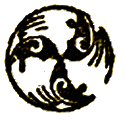
FOR a man whose subject was not pyramidology he sure knew a lot about them. I wish I'd had a Harvard education instead of just good common sense. "You mean," I said, "these things are gun sights, to pick out when the sun would be in the third house of Venus and in trine with the moon?"
I had to let him know I wasn't entirely dumb. I'd paid five good bucks to an astrologist once to have my fortune done on a chart and he used all those magic words. I remembered them five bucks' worth.
Damn if he didn't agree with me. "Probably to plot the course of Venus, that had considerable pre-Mayan importance," he said. "And you can see, sighting between the first two fingers of this left hand, over the top of the farther cross, you get a line to what must have been the truncated cone of the pyramid before it crumbled; and beyond that is where Venus should appear in the sky at certain times. Similarly, sighting over the ninety-degree angle of this arm to the top of—"
I couldn't hear him any better than I could understand his heavenly bodies. My head was buzzing. He had chopped my sprouting hope-tree plumb to kindling. I was so worn flat—yes, and mad at all his superior lessons—that I gave him what I'd been holding off these many days so as not to worry him.
"All right then," I said. "I can't argue with you, you've got it all down pat. So now listen while I tell you what I know about Mayas and whoever it was that was pre-Maya, like you say these near-blonds are a left-over from. Listen good:
"They've been polite, haven't they? They've fed us, hacked a path through the thorny lianas for us, and now they're giving us a cozy home and women to rustle the chow, and I'll bet it'll be the best they've got. And d'you want to know why? When the Mayas needed some sacrifices they picked the best of their prisoners and fed 'em and clothed 'em and gave 'em girls to play with; and when the sun, or Venus or whatever it was, hit the right spot over the range-finder they marched the whole troop of 'em up the pyramid and sure 'nough sacrificed 'em. Sun gods and Venus gods and Bat gods with skinless Xipe sons, all got their quota. So I'm wondering which god the range-finders will point to, come the next bright day."
That got under his lecture-room hide all right. It had all been lessons to dummox me up till now; but this was putting us on an even footing, right up our own little alley that we'd busted our way into. I thought he ought to know all about those bloody Maya tricks already; and maybe he did, only he'd never thought it could happen here. He looked at me like half doubting. So I felt mean enough to give him some more.
"And I'll tell you what isn't guessing or believing travelers' tales out of old books. At Chichen Itza, that isn't such a helluva distance from hereabouts, is the Sacred Well. There they'd give the picked boys and girls a grand party and weigh 'em down with jewelry and heave 'em in—and if you want to doubt that, I know the American consul who wangled a permit and got a diver to go down and fish up a truck load of bones with the gold bracelets still on 'em."
Yes, he knew about that, because it was modern history and some of the museums got some of the loot. He didn't have any lecture to give this time. He was swallowing great lumps, digesting it all down. But he had guts; he wasn't ready to quit. He said, "Those victims were bred to believe it was an honor to be sacrificed and so they possibly didn't try to escape. We—" I couldn't grow another hope-tree. Like I said, I had hard common sense. Escape? Hell, they could treat us like princes while they waited for their astronomy to swing around, but they'd be watching us by the second; they'd catch us within the first mile.
And they proved it right now. Silver Face and some of the boys came edging round their rubble pile to see what all we were doing with their crosses that weren't any Faith. Hope, and Charity, but were range-finders to a date in the sky.
The Prof had his guts all right. He said, "We can't let them see we are afraid." And he peered and sighted along the arms and fingers of those cursed acolmite things and made some of the old Maya noises that he'd learned out of books, and durned if Silver Face didn't just coo over him. He had me translate that the Prof was sabio el mas simpático and, what always seemed to impress them most, that he was a student of the ancient cultures, and he'd have to come and see the Mexicatl Teohuatzin himself. That was the One Who Orders.
The Prof took over where I had quit and started his own li'l hope-tree. "If we can impress the high priest," he whispered, "this may be an opportunity for—" But he didn't have any idea for what.
They took us to our new home first; and I didn't like it one bit. It was quite one of the best bamboo and thatch huts in the clearing. And presently the promised women came along with supper, and I didn't like them a hoot either. They were beauties. This was too much like the old tradition of treating us like princes in order to fool the gods they were getting somebody worth while.
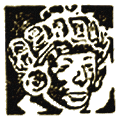
AFTER supper Silver Face and Jaguar Hat came together and took us off for the promised chat with the big shot. The Prof had been building high on this interview; but my liver, as the Indios say, turned to water and oozed out at my foot soles.
Mexicatl was masked and it might have been gold, for all I knew or cared. What set my back hair crawling was that his head-gear was the blue cotinga! And that, if you remember, was the third emblem of Xipe! The one who liked his meat flayed before he got it!
This one was old too; you could tell by his hands that looked like somebody else's much bigger, peeled off and used like princes who knew all about astronomy—if there are any of that kind of prince these days; though, what I've heard, the Maya princes had to know all about it to qualify as the elite. It kept me guessing, first, to understand what the old wizard was saying, and then inventing to try and explain it to the Prof.
I didn't do so well, so there had to be a demonstration. They took us out to the crosses—I mean, the cursed range-finders—and there was Venus blazing like an arc light over the shoulder of the pyramid. Only the range-finders didn't range right. Even I could see that when you took sights over the notches that Venus wasn't where she should be. Where he should be, I mean, because his name used to be Tlauizcalpaantecutli, and with that much name to keep up with he was a hungry god and I'd seen him carved in stone as a snake with all of a man disappeared down his gullet but the guy's face that still struggled between the snake's teeth.
But it got the Prof all excited; all pepped up like he'd proved something. He said, "Tell them, why of course: That since the period, obviously very ancient, when these markers were set up, Venus, owing to the precession of the equinoxes, is quite perceptibly no longer where she used to be." And was that a helluva note to ask a guy to translate into Spanish! "But, tell them," the Prof promised like giving them back something they'd lost, "that in about some twenty-three thousand years or so she'll be back exactly where the old astronomers marked her." And he was all hepped up about it. So much that, though I couldn't care a whole lot what happened twenty-three thousand years from now, I had to ask him.
He said, "But don't you see, my dear man, that, even without delicate instruments, we can take the minute variation—" He could see I wasn't understanding, and he went into a schoolteacher's impatient rage. "We can roughly measure, my good fool, the distance between where Venus is now and where she would have been when these markers were set up, and we can then calculate back to their approximate date, whether Maya or pre-Maya or—" He went into a starry-eyed dream about it.
I was making all allowances for both of us being pretty well nerve-strained, but I didn't like being named a fool before company in that stupid-kid tone of voice. I said, "Or Mu. Your Lemuria before it sank, as proved by Alley Oop in the funnies."
For a wonder it didn't rile him this time. He was in his dreams. "At all events," he sort of whispered, "it would be evidence of cultured man on the American continent infinitely antedating Egypt or Chaldea. And then, if I have translated my glyphs correctly—"
He dreamed happily on. Sure I got it, but I couldn't enthuse. He meant, of course, if he'd read his maguey papers right his treasure story held good, and right here was the spot. Helluva lot of good whatever tonnage it might be of treasure would do a couple of prisoners being treated like princes, fattened for the kill till Venus would show up where she ought not to be, but might have been when the marker were set up ten thousand years ago or whatever. Which left our date for doing the last mile up those pyramid steps pretty well up to the close harmony of friends Silver Face and Jaguar Hat and Mexicatl Teohuatzin.
They weren't hurrying about it. They left us to have our good times any way we liked; though how princes had any good time in all that rain that came through the thatch roof was beyond my guessing, and how they lived long enough for the fiesta before the bugs ate 'em up raw was another mystery. But the Prof harped back on his climatic changes and said it couldn't have rained so much in those gay old days. What I wondered was whether they hadn't perhaps softened up some of their jolly old customs in this modern rain. But my hope-tree wouldn't sprout again.
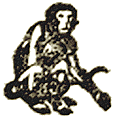
THE women they sent to housemaid and waitress for us were the best on the lot. I could have been interested if I'd had the guts of the Prof, figuring a way out of where there wasn't any way. The chow, too, was a heap better than a lot I've lived through; wild pig and monkey and yams and all—though it did give the Prof a turn to have one of the blue-eyed cuties serve up one day a dish of roasted monkey hands on a banana leaf. Me, I never liked that gristly stuff, like pig knuckles and all.
And they brought us worse—what turned my stomach. Jewelry! What I mean, bead necklaces. Old, old crooked bits of stone that could have been jade, and some of 'em turquoise, that must have taken a month's work to bore a hole in each one with cactus thorns and sand abrasive. "Museum pieces!" the Prof breathed and had the nerve to wear his.
I told him, "All it means isn't that they're not honoring us sufficient; only that they've used up all the old family gold and silver pieces, heaving 'em into wells or burning 'em with loud hurrahs to Ixi-Poxi-Hoochi-Cattle or whatever twisted monicker he had."
He said, "If you are so infernally pessimistic why don't you do something, instead of just sitting waiting?"
As though these was anything a guy could do. Why didn't these other old-timers who were being fattened up like princes do something? Where would they run to, I asked him, and how far, with midget spooklets radioing their progress all the way?
He was getting sort of hot and bothered himself now, what with inaction and knowing nothing. I told him, "Well, for gossakes, let's put in our time digging for your treasure, since they let you do anything you like. We can at least look at it, even if we can't take it with us to where we're going."
But he said, sort of hopeless, "It's nothing that can be dug up."
"What d'you mean, not up?" I said.
"It is something hidden in some small niche somewhere about the pyramid, or perhaps in some hollow in a stone idol. Perhaps one of the priests may make use of it when—" He gulped down the rest of the when.
And if I hadn't already been lower than the belly-scales of a lizard would that have left me flat! Not about the loot not being buried; but about the words, small, little. Migod, it'd have to be diamonds to make it worth while; and nothing I'd ever heard about the Mayas, or Pre-Whoever-they-were, ever said anything about the Mex jungles growing diamonds.
The Prof wouldn't elucidate. All he'd say was that it was one of the most ancient sacred symbols in the world and therefore "priceless," and he clammed up on his personal translations of his blasted old maguey papers like he had something religious that mere laymen mustn't meddle into. I've noticed that about those hard-bitten científicos. Nothing sordid about them; they don't want money; all they want is something nobody else has got; and let 'em get onto a secret, they hug it like their hope of heaven—those that are so stuffed with education, they don't believe in heaven. Me, I'd stuck my neck into this, looking for sordid money, and I wouldn't have stuck it half a mile beyond jungle fringe if this crazy clever fanatic hadn't outsmarted me, talking words like fabulous, and priceless.
But I couldn't believe him all that much of a nut—heck, he was Harvard, wasn't he? I said, "Well, I suppose you've got some millionaire angel who'll buy it for his pet museum."
And he said, "Well, yes." And, "Let us go and talk to the head priest." As though anybody ever got money out of a head priest.
So we went and squatted in the wet with Mexicatl of the blue cotinga hat, who hadn't a hut as good as ours. He was polite; he was cordial; he was our long lost brother—and he could keep secrets as well as the Prof. So we talked astronomy. What I mean, he talked sky-piloting that I couldn't understand and I invented explanations so the Prof would guess what he meant. The Mexicatl was awful interested in Venus. The Prof was just as interested in explaining to him all her straying from the ancient path in the sky.
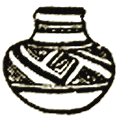
ALL of the chatter got us nowhere; not to any little niches in idols, nor even to when might be the zero day. But Mexi did say, dodging around my questions, that his people were descended from Fair White Gods.
"Lordamighty!" I had to splutter. "That old Cortez baloney again?"
But the Prof shut me up; he was eating it up. "He means, supermen, of course, you fool," he said.
I couldn't even kick at being a fool any more. And the blond supermen came, old Mexi said, from a great island in the West where they had known all about everything—like flying and all that. But they got too smart, it seemed, and the gods got mad at them and sank the whole kit and kaboodle of them.
So there it was again. Lemuria, Muya, Maya—and, for that matter, the old Bible flood and the Polynesian inundations and the Tower of Babel or whatnot—I'm not up on those things, nor I wasn't giving a faint hoot either. Even the Prof was so low that he couldn't get steamed up about proving anything.
All he could lecture was something out of the Bible that I didn't know he'd ever read. "There are more things in heaven and earth, Horatio, than are dreamed of in your philosophy," he mumbled.
I said, "C'mon, let's get back to the girls they've given us. They at least have golden, sunburnt faces and not a gold mask; and I'm taking your advice on 'em too."
"What do you mean?" he said. "I never advised you about women."
But he had too. "Pocahontas," I reminded him. And true too. I wasn't building a whole lot on it; but I was trying my sweaty, unshaven durnedest to make the proper hit with Hedy and with Lana and with Myrna—I couldn't sort out their other names. Not that anybody handicapped like I was, what with trying to say pretties under a dripping tree and my hide wrinkled leper white, could expect to get anywhere fast; but they were sort of cooperative. They didn't know any of the rules of civilized catch-as-catch-can, but they sure didn't mind who looked on from under the next wet eaves, any more'n a Saturday Coney-Islander.
It was the Prof who added some cold water to the warm rain. He said, "If your pessimistic theory is correct, they won't be of any value to us, however successful may be your amours. If we are being fattened, as you say, for the feast, they will come with us."
It sure shook the ardor. But if they knew all about their cursed hang-overs from some beastly old religion, how come they could giggle and slap back?
He said, "They are in the limelight, the cynosure of all the populace, and all women enjoy that." He surely had tumbled off of his own flourishing hope-tree. "And furthermore," he hammered in another nail, "it is possible that they are being given small doses of the caapi drug and are abnormally exhilarated beyond concern for the future."
I went to Silver Face and told him I wanted a daily slug of caapi. He was polite. He said, "The women will bring it." And that was worse than if he'd said no. If I'd be needing something to deaden pure stark fear, Migod!
But, well, the way things turned, I never got it. There was what Army used to call a diversion. Not meaning fun, but the enemy cutting in from another angle. Excitement buzzed around the hut warren. The masked tlenemacacs remained in long huddles. They drank the magic hooch and talked out loud to their invisible midgets; and at last Silver Face came and gave us their wireless long distance. It whooped me up more than a barrelful of any booze.
"White men are coming," he told me.
"White men? Here? How did they ever find their way, and why?"
"Bad men," he said. I didn't believe him. I was ready to count any white men as pure shining angels.
"They have caught some of our people," the old boy said sadly, "and they are torturing them, the same way the first white men did, to show them the way. They come with guns and we cannot at present prevent them."
At present? I found out suddenly that I knew how to say a prayer and I said it out loud, the way our colonel used to: "Dear Lord, let the advance hold its drive."
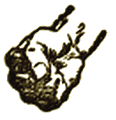
AND it worked; as well as it so often did for the colonel; even though my call didn't have, like his, a lot of us boys helping it hell and blazes on. Seven men, the hooch voices said, and they'd be here in four days. And they were as right as press despatches. Third day we heard some shooting; meaning, with a fair wind, about five miles, and it would take any relief party a day to shove through that jungle.
But by what miracle a relief party, the Prof was asking; and who could have sent them—or rather, it? That guy had to be grammatical even in the face of a miracle. I wasn't counting on any miracles for me in the jungle, I told him, "I'll give you one good guess and I'll bet my half of your priceless loot hidden in an idol's belly on it."
That learned innocent couldn't guess. But you can. You know as well as I did that it wouldn't be anybody but that same gang of claim jumpers who'd been so hot on the Profs treasure hunt trail. Nor it didn't take any telepathy to tell me how come. They were smart, those boys; plenty smart enough not to believe our yarn about going home after the flying pole fiesta, and tough enough to grab off a couple of Indios and put the screws on 'em to squeal.
It turned out they'd grabbed two of those doped flying initiates of the cult and they sure had put the screws to 'em. They had no dope in 'em now and when the gang busted into the clearing the two were bled pure white and close to dead.
But I was gladder to see those ragged bandits than ever I'd been to see my discharge papers. For the first time in a coupla months I could pull in a full breath and let it go with a whoop. I could have kissed every bearded, sweaty son of a mad dog of 'em. I didn't know their religions, but I was sure as hell they wouldn't be Zotzilahas or Xipes who treated prisoners like princes till they were ready to eat.
And good and right I was too. They didn't treat us like princes. The boss of the gang, that same big lug I'd conked in the saloon, staggered up to me—he was pretty near crazy with the trip and the rain and bugs and all—and he didn't throw any arms around me as a white compatriot.
He said, "So you're the clever bastard who horned in on our game, huh?"
And the two punks, that I'd met at the fiesta were with him of course and they yippeed like they'd run down a possum. "Yah!" they howled. "Old Shotgun Dave himself! Li'l ol' D.D.T., no less. Let us at him, Hoimie; he slapped us down back in town there."
But Hermie, the big baboon one, said, "Me, I'm first. The big so-and-so socked me the first minute we met and here's where he gets it back." And he hauled off and smacked me square over the mouth; and in the same second the two punks jumped in, ki-yieing, and started swinging on me.
Well, I didn't want to get into any fight with the rescue party. I just wanted peace and good will and get the hell outa there. But what could I do but kick the punks one apiece in their stomach to hold 'em a while. I told Hermie, "What they said about D.D.T. is right, and it's here." And I plastered him a nice fast one under his chin from my belt line up and lots of ugh to it.
So he ughed and I had just half a second to see him lift off his feet and drop, and then another one of the gang swung his pistol barrel across my ear and that was lights out for me.
And that ape wasn't fooling. It wasn't whether I lived that was important; it was the Prof they wanted whole and talkative.
I didn't come out of that smack until along about evening; and when I did they had the situation pretty well in hand. That is to say, most of the Indios had beat it into the jungle; all the younger ones, anyway; though they'd caught some of the women and the old wizards who couldn't run. Jaguar Head and old Mexicatl himself.
What brought me out of my long dark was hearing the Prof yelping, "Ouch and Oo-ooh!" and groaning, "But I tell you I don't know where it is; and it's not what you think anyhow. It isn't buried treasure. There never was any buried treasure."
They had him tied to a tree stump and they were sweating him for the dope. They just laughed at him when he said there was no hidden hoard.
"Oh yeah?" Hermie said. "You think we're as damned fool like yourself? What'd you stake yourself to this trip for? To collect peanuts in the woods? Ya silly goat, you lectured to all your snooty college boys that you'd doped out a paper with all the info about a priceless treasure. And we know some of the boys, see? Don't come any o' that innocence on us. Give his arm another twist, Buzz."
Buzz did and fetched a screech from the Prof. But what could the Prof tell? I was sure enough he hadn't been holding out on me when he said we'd have to try and worm some information out of the priests. They'd have to kill him and still get nothing. I guess they would too, they were that mad. And then I heard a voice that spoke college. Perhaps not pure Harvard, but this boy had been to school.
He said, "Certainly he's playing innocent. Steve Vanesky from the college gave me his verbatim shorthand notes on the lecture and it stated definitely that the professor had deciphered records leading direct to 'a fabulous treasure' in these parts. But some of these intellectuals have an extraordinary staunchness of will. Better try the guide fellow a while. Very often those muscular men break easier than a brainy one."
Anyhow I was brainy enough to lie as stiff as a crowbar and pretend I was still out cold. Hermie and a gorilla called Jake came over and kicked me to see and I did pass out cold again.

I CAME out of it with rain falling on me, and it was morning and I was out in front of our hut on my belly with a rope tied to my wrists behind my back and hitched to a tree. Some of the gang was in the hut, laughing about something and then growling about, "So they think they don't have to talk, eh?"
Presently three others of the gang squelched into view, shoving along a half a dozen girls with baskets covered with banana leaves. That would be breakfast, I figured, and my stomach turned at the thought. The apes shoved the kids along with guns at their backs like they might be hardboiled Heinie prisoners. You could see that, even though they had command of the clearing, they were still nervous about something.
One of the girls was Myrna. She cried when she passed me—or maybe she'd been crying anyway, I don't know. I hollered to her, "Anakuach, Chusi." That was some of their lingo I'd picked up and it meant, "Cheer up, Little One." And I had to add in Spanish, "I'll get you out of this."
A fool enough thing to say, hog-tied like I was; but what can a man do after he's been spending weeks trying to persuade the girl that a loving gesture would be to get him out of a hellish jam? One of the gunmen trod carefully on my lashed wrists as he went over, and did that crunch! He said, "Get yourself out of it. Buddy, and you're doing good."
I told him, "I will, Punk, and I'll remember to thank you for it." So he just back-heeled me in the face and drove the girl on in with the grub. I couldn't see in, of course, but I could hear the kids scream every now and then and I wondered whether I liked my nice white compatriots any better than some of these savages who'd come a long way from white.
The gang took their time over breakfast and parlor-sports and then big Hermie loafed out, picking his teeth, and said, "Well, let's give the professor another whirl."
And then I saw that the Prof had been lying out in the rain too behind the stump. They hoisted him up and I could see that he'd been getting the proper works yesterday. His face was swollen like a summer squash and blood-streaked heavy enough so even the rain hadn't washed him clean. He was near enough dead to make even Hermie stop and think. But they propped him up and Hermie tried him out once more.
"Remember me, pig-head? Can ya see me? I'm the guy that's going to find out where your boodle's hid ... Will ya talk now?"
The Prof just swayed with his eyes closed—they were bunged pretty near shut. Hermie growled, "Aw hell!" and slapped him and his head lolled. The boys let him go and he flopped; he was so near dead they hadn't even tied him. "C'mon," said Hermie. "Let's see if the other bastard can be as tough."
They hoisted me up and couple of them held me against my tree and the Jake gorilla kicked me in the groin just as a starter. I would have doubled up but that my two holders straightened me out so Hermie could slap me till I got my breath.
I said, "Listen, you guys. This Prof isn't holding out. I tell you he don't know. All right, he's got something out of his old papers and it's somewhere around here, he thinks; but he don't know where it is."
Hermie laughed. "You tryin' to kid us a hard yegg like you came all this way on no more guarantee 'n that? Kick him another, Jake—but good."
Jake did, and I guess I must have groaned. Through the pounding in my ears I heard the Prof's voice, game guy, putting in a word for me: "He doesn't know anything; not as little as I do. I must repeat, we have found nothing."
My lower belly heaved up and I was able to vomit. That relieved the pain in my groin some and I could think a hazy bit. I tried to be clever—oh, damn clever. I said. "Sure. What d'you think we stuck around here so long for? We weren't tied down. They treated us like princes; only of course they wouldn't admit there ever was any loot. We were trying to worm a hint out of the old witch doctor."
And on that the Prof's voice came again, strong and angry. "Shame on you, Dave!" he croaked. "Shame for diverting their brutality onto those old priests."
"Well, hell, I had never meant it that way. I hadn't even known they'd managed to grab any of them."
My thinking was whirling around dizzy anyhow. But it hit me like another smack in the face. Hanged if the Prof hadn't taken his beating and kept mum about the wizards. Damn right he had staunchness of will. And if he'd kept his mouth shut now my own dumb crack might have gone by without notice. But did his holler give Hermie an idea!
The whole gang whooped and Hermie snarled, "Someone kick me for a chump." I would have if I could. "Sure, those old buzzards would know. Bring 'em over, and, by the holy tripes, they'll squeal."
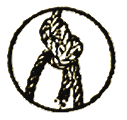
OLD Mexicatl and Jaguar Head had been slung in a hut, roped like calves for the branding. The boys kicked them out. Their masks had been smacked off, of course, and I could see they were a lot older than I'd thought.
Hermie ordered, "Give 'em the back hoist first and let's see what they'll take."
The back hoist is something the Japs taught some of our boys. You just tie the poor devil's hands behind his back and throw the rope over a tree limb and hoist; that's all. The trick is to inch up on the rope until, if the guy won't talk, it tears the shoulder sockets out.
"Thet older one'll likely break down soonest," Hermie said. I wondered where he'd learned his stuff. I was damn sure he'd never been in the Army and captured. I wouldn't put it beyond him and the rest to have thrown in with the invaders as they grabbed some of our islands and collaborated. So they tied the two old fellows up and put the lift to them.
Talk about an Indian being stoic and taking it. I guess that sort of guts belongs with the whole race, whether they're pale mud white and say they stem from a fairy tale island in the Pacific, or whether they're red and we guess they started from Mongolia. Old Mexicatl, done up in macaw feathers and a faded poncho, like I'd always seen him, had looked just a funny old faker to me; but now, doubled forward as he was, with the devilish pull on his arms behind him, he could still lift his head and glare right back on his torturers and he looked like—well, like a sure 'nough priest. What I mean, like some of those old evangelists who went West before our own Indians were tamed and they got scalped and all the rest of it while the savages whooped around. Like a man who's really got something to him. This crowd of treasure snatchers didn't exactly rate as savages, I suppose; but only because they didn't paint their faces and wore white men's pants. But they whooped as old Mexicatl groaned. But he didn't squeal. He glared back at them like that and never a peep out of him. His lips moved, sort of awful deliberately and slowly, mouthing out words, and they weren't pleading either.
"He is calling the names of the old gods," the Prof said. "Putting the ancient curses of all the elements on you." He sounded like he was scared of the stuff himself.
Hermie laughed his bull laugh. "Any old time," he said, "any old gods can do anything to me, they're welcome. Go ahead, boys, give the old crow another couple inches."
Well, what's the use of piling on the agony? Neither Mexicatl nor Jaguar Head broke; though their shoulder sockets did. Till Hermie—he certainly had learned his stuff somewhere—said, "Leave 'em hang a while; they'll soften. Maybe some of the women or kids know enough to give a hint. Kids are always nosey and find out secrets." So they let the old men hang by their ligaments and went to the kids.
They figured, if the Prof could talk up that strong, they'd better hogtie him too; and they trooped off to some of the farther huts to see what they could do. I couldn't see, but I could hear some screeching. The Prof's voice said, "Good God! It is as pitiless as an inquisition."
Maybe it was; and we used to tell ourselves that that was something only the old Spanish Conquistador crowd did, saving souls and gouging gold out of Montezuma's people. But these good white compatriots of ours had learned all right. Perhaps it was the war, I don't know. Perhaps just gold. All the yarns of treasure hunting I ever heard, somebody always sloughed the old inhibitions and went wolf. With this crowd the whole pack did. They'd come for gold and anybody in the way was slated to get hurt. They spent a whole hellish day going over prospects. They got nothing, because they came back as savage as timber wolves; some of 'em looking like butchers. They kicked me, going by, just for fun.
Hermie snapped, "Better let those old medicine men down. We don't want 'em to die on us."
I was a whole lot better off than some, since I'd been lucky enough to get that crack across the skull and I hadn't been given the real works. I felt good enough to be mean. I told the gang, "All right, I don't suppose you're going to feed me and I can stick that out; but in case you may be wanting me yet, just leave me tied out center of the clearing; because these Indios use the blow gun and curare darts and by now some of 'em you didn't catch will be creeping back at night,"
It was a lie of course. I'd never seen a blow gun among these boys. But it gave the gang something to add to their nerves about what might yet come out of the jungle and I could pretty nearly laugh when they all huddled in the middle in the rain, away from the jungle-edge huts. Not that they took me or the Prof along; they let us lie roped, and if anybody got us that would be our hard luck. They weren't needing us; they had a better bet with the old wizards.
And you won't believe it, but right away I started another little hope-tree that night; and I'll tell you why. I was beat up enough to be dead dog-tired and I was able to do a fair imitation of sleep. Which I came out of with a yelp and something pawing over me. The something said, "Asssskt"—which is the same as our "Hush!"—and it was one of my girls! It was hell-black but I judged it Lana's voice. They hadn't caught Lana. She said, "The Silver Mocuatzin says, 'Anakuach.' There will be a rescue."
Have you ever said prayers to a single word? I wanted to; but all I could think was the way the colonel would say, "The raiding party will set their watches to mine and at exactly one hours, by God, we'll go after them.'
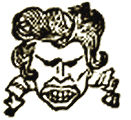
THE Mocuatzin was Silver Face; they hadn't grabbed him either, being younger than the other two tlenemacacs. He was the one who had first picked us out of the jungle from the chicleros and did most of the invisible midget mumbo-jumbo. He had more git-up-an'-shove and I could believe he might organize something.
Lana said, "He has sent out the magic message and more of our people are coming. He wants to know now many shots those white men's guns will fire."
"Well, for gossakes," I said, "If he's fixing to stage a raid cut me loose and I'll be in it with blood in both hands. That gang is none of my relatives."
She said, "I dare not; otherwise they will kill all the prisoners, trying to find out; and moreover, says the Silver One, they will thus be warned."
I didn't know whether I should try to kiss her or to grab her and beat sense into her to cut me free. But there was sense in Silver Face's thought that, if he was figuring to jump a gang of gunmen with just macheteros, it'd have to be a surprise job.
I told Lana, "There's just this much luck. None of 'em carry tommy guns. I saw only one rifle, an old thirty-thirty single shot that they must have black-marketed from somebody in Papantla village. There little guns that they could smuggle in baggage will shoot six times each and then it'll be a matter of how much time they'll get to reload."
She had to know how many shots was six times seven men. She'd come a long way from that old superior race if she couldn't do multiplication tables. I did the sum for her and she said, all right, the raid would be tomorrow night. It would have to be tomorrow because Tlauizcalpaantecutli would be ready; and before I could ask her what that mouthful had to do with it she slid away into the dark.
The mouthful, you'll remember, was Venus. I lay wondering what the hell Venus could have to do with a raid and the best I could make of it was that she would be in trine with something or other that made for good hunting.
Of course I couldn't sleep any more that night, even though the rain quit and I steamed off some; and the longer I lay awake, the deader my little hope-sprout withered. A rescue? Even if they pulled it off. From what? And for what?
From the gang, yes. But the gang, at worst, would beat me up and perhaps break a leg or so. But for what was the thing that crawled up and down my spine. For what had they been saving the Prof and me? And how much better would they be loving any white men after this? We'd all look pretty much alike to them, wouldn't we? Out of what frying pan into whose fire? All in all, Lana hadn't handed me such a much of anakuach cheer.
Morning took a hundred years to come. But at last I heard the watch the gang had posted for the night cussing out there in the middle of the clearing and the gang woke up and cussed back and daylight crawled through broken clouds. I could be grateful there'd be a little sun and I'd maybe get a chance to dry out.
The chow party went and untied the kitchen help and drove 'em to rustle breakfast. They took their time, like before, and then Hermie came to look us over. I was good enough to leave tied. The Prof, he figured, had better be loosened and given some tortilla wrapped around a yam, there being just a chance that some information could yet be twisted out of him; and then they settled down to go to work on the two old men again.
They slung the ropes over a limb and hoisted them to their feet—but I'll cut that again. It was the same technique; another inch on the rope; another smash in the face; another knee in the groin. Hot cigarette stubs too; all the devilish tricks in the list. Gold was what the gang had come for, and, by hell and damnation, they were set to find it. They worked on those two poor battered old medicine men through the forenoon and all they got was madder by the minute. My two gun-punks of Papantla were all for shooting chips off the prisoners' ears and other corners.
But that was where they made their error, putting and shooting idea into Hermie who was looking like a Halloween mask himself. He had his own gun in his hand half a dozen times and only held back by busting blood vessels in his fat neck and telling the boys, "By all hell, as long's they're alive I'll make 'em talk."
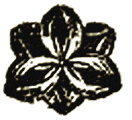
I'VE seen rages in my time—among drillers' bosses when some brash crew man sassed them; but Hermie's was well up to the maddest. I suppose, in his time, he'd battered and burned men to squeal. But not those two old priests. He couldn't break them down. He wasn't used to that kind of guts and it was his own rage that broke him first. He went plumb berserk. He frothed and he gibbered what would have been cuss words if they'd had any syllables. It was something I couldn't believe to see old Mexicatl's near-death face slowly twist to a grin.
That was the limit for Hermie. He smashed his fist into the half dead grin and then suddenly he snatched his gun and let the old man have it! Slam in the chest!
The old wizard slumped and the boys on the rope were so taken aback they let go and let him drop. Their ace in the hole! Whatever he knew blasted for keeps!
Nobody breathed for a long breath. Not a one of them dared even look at Hermie. He was mad dog enough right then to shoot it out with anybody who'd say a word. They just looked at one another from under their brows, mum scared of the boss.
It was the Prof who scrambled to action—they'd loosed him, I told you, and given him some food. He scuttled forward croaking, "Shame! Shame on you brutes!" and he made to pick up old Mexicatl. He wasn't able to lift him; but he halfway sat him up and felt into his blanket for the wound. You could see blood spout up his sleeve in great throbs.
But what use? The old man muttered something and the Prof said, "Si, si," which was about the limit of his Spanish; and in about another gasp old Mexicatl Teohuatzin, who ought to know whatever might be about any hidden loot, took all his secrets with him to tell 'em to Zotzilaha of the dark bat wings or to Xipe, the one without any hide, or to whatever old gods took charge of such matters in his savage beyond. I figured he'd have something to tell them about civilized white men too.
The gang gawped like cart bullocks when they pass anything dead on the road. Still not a peep. Hermie damned them all and flung himself off; into the hut—to kick himself, I guessed, when he'd come to his senses. The Prof still fumbled hopelessly over the old man. Nobody said a word to him. The gang slouched off one way and another, their lips moving, but nothing loud. I, hog-tied, could just lie and look on. I wondered which one of them would work up nerve enough to shoot it out with Hermie.
My wrists were swollen under my two days of rope like they had gangrene. I thought here was a chance and I called softly to the Prof to leave the dead man and come over to a live one for a minute and perhaps I'd be able to creep up on someone and grab his gun and see who'd shoot it out with Hermie. But a pair of the apes heard me and came back.
"Gettin' ideas, huh?" That was Steve, one of my punks. "Tie up the old goat again, Stoop." And to me, "This'll stop your wrists hurting for a spell," and he rapped me across the eyes with his gun barrel, and I didn't feel wrists or anything for quite a while.
It had become a habit with me to come out of a trance, hearing yelling. This time I could recognize old Jaguar Hat's voice. I supposed some of the brighter boys were trying him out somewhere with some fancy technique of their own.
Hermie yelled out of the hut, "If any you guys can get any dope outa him, all right, I'll resign."
Hermie, the big yellow gorilla, had come to his senses and was having some private moments, thinking about what his gang was thinking.
Along about sundown the yelling quit and Hermie came charging out of the nut, hollering, "What have you blasted monkeys done?" All bulldoze and authority was Hermie again. I suppose he figured it was even-Stephen now. I could hear him off by the farther huts shooting off, "All we got is the fool of a professor now and his muscle man."
I looked to a rocky tomorrow that would make this last couple days feel like Momma's lap. The new little hope tree was flat dead. But there was Venus yet. The rain had quit since last night and, as the sun went behind the trees, there was old Tlauizcalpaantecutli like an arc lamp, near enough to reach out and fondle—if he really was meaning something to Silver Face and his marauder commando; though I couldn't shake the old pessimism. What good would it do us white prisoners either way?
Still and all, as the night closed in, I wished I could have set a watch to the colonel's time and could know just when was zero hour for whatever might be. I mean, I wished just at odd spells when I wasn't busy trying to kick my face with my foot. I don't have to tell you that mosquitoes and all the other bugs come marauding after a rain.
The gang was out in the middle like before. I could hear them cuss, "Only damned thing to do is pull your shirt over your head."
That went for the night guard too; so they couldn't hear so well. And that was when the other marauders came.
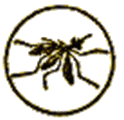
I WAS plenty awake and swelling to the minute—I've never figured why mosquitoes always want to crawl into your ears and buzz. I heard nothing else. They crept in like jaguars—I mean the machete marauders this time, not the lance stabbers. And then the sudden racket that busted into the night would have waked a dead 'un. Came a smothered yell from a guard and it was cut right in two by the chunky sound of a machete biting deep. A lovely sound. A sound like heaven arriving—and hell.
Then all the yelling the jungle could hold and not fall apart. White men, Indios, all together; and pistol shots. A hell of a lot of shots! Like I said, I hadn't seen any tommy guns, but those boys must have been experts at fast loading.
How long, I wondered, could the gang hold out against those yard-long machetes, at close quarters, in the dark and all? I was whooping, without thinking, for the Indios. Till it came to me with a jolt. The Indios weren't fighting to kill; they were fighting according to the old tradition—to take prisoners!
That was how Cortez and the Conquistadores didn't get wiped clean out on the night of the Noche Triste when they retreated along the old causeway, canals flooded and bridges down. The Indios wanted prisoners, not corpses. Prisoners for the gods!
And well, to cut it short, they got 'em. They got four, it turned out later. I don't know at what cost. When the scrimmage and the yelling finally burned out, torches came and the clearing was jam full of Indios; leaping shadows with tails—jaguar pets—they looked like a mop-up crew of devils. Some of them carrying off the casualties and most of them in a hurry to start a fiesta right now. They built fires in a ten-point star—that's the sun's rays, you know—and they got down to the serious business of dancing.
Somebody remembered to come cut me and the Prof loose and they said, "Come on, join in," and they rushed off to do their bit. It took me a good hour, at that, to work the deadness out of my joints and crawl over to give the Prof a hand. He was in worse shape than I; I mean, physically; but durned if he hadn't collected up his nerve and was as chipper as before we ever became old gods' prisoners.
He said, "Didn't those men say, 'Venga, amigo'? And doesn't that mean. Come along, friend?"
"Sure," I told him. He was learning fast, but wasn't he forgetting we were their good friends all the while they were treating us like princes?
He was his old superior self. He knew it all. He said, "Good old pessimist. But don't you see, our status is quite different now. Our kind compatriots expatriated us from our white heritage and put us on a par with the savages."
I told him I wasn't feeling so proud of the white heritage myself just now and if he was so blamed sure we were as good as Indios, come on, let's put on feathers and get a torch and toddle in to cinch it.
We didn't do quite that, but we hobbled around the outer edges and watched, and to me it seemed that this crowd was a lot more serious than I'd ever seen any fiesta. The Prof said it wasn't his subject but it was extraordinary how these dance patterns resembled the pictures in the Troyano Codex. He had to explain to me that this Codex thing was one of the few priceless—he had to tie that word to anything old enough to be moldy—one of the priceless picture paintings that the Conquistador priests hadn't gotten hold of and destroyed in their craze to stamp out everything that they called heathen, and it was from the pictures that the científicos got what little they knew about pre-Cortez customs.
I guess I still ached from my share of getting smacked around so I could see the dark side of any picture. I reminded the Prof that the traditions mixed up with dance patterns and all the ancient whoopee included a fine finale act of marching some of the guests up a pyramid that was flat-topped to leave room for four strong young priests to hold 'em by their arms and legs over a carved stone with a hollow in it and a channel for the overflow while a fifth gouged out their heart with an obsidian knife. But you couldn't shake his new pep, now that he was out from under the hands of our paisanos and just in the hands of some wild, whooping Indians.
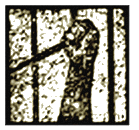
NEXT morning, Silver Face showed up and he was polite to us in a different way to what he'd been when we were being treated like princes; he talked like we were common folks and friends. He said to explain it to the Prof that he and his people thanked the honored student of the ancient mysteries for having done what little he could to help the Mexicatl Teohuatzin on his way to meet the old gods. More, that he personally thanked the sabio, the wise one, for putting him right about the proper position of Venus; for that enabled him to set today as the necessary date for the ceremony. And in spite of Silver Face's new palsy-walsiness, did that word heave my heart up to my back teeth! I had gotten plumb allergic to everything to do with ceremonies. And then, last, Silver Face did a magic and handed me a hope-tree full grown and sprouting. He said to tell the Prof that it would be his, Silver Face's, personal loss in his studies of the stars when we went away.
Get that? When we went away! I shoved my elbow to the Prof's ribs as I translated it, and he ouched and said coolly, yes, he'd been counting on that.
I couldn't take his word; I had to verify. I asked Silver Face if he meant we could pack up and start for home without a picket fence of machetes sprouting out of the jungle in front of our faces? He said, yes certainly, as soon as we were recovered from our hurts; because—and he said it as simply and surely as more rain coming or anything else that couldn't be prevented—now there were enough prisoners to satisfy the old gods, who had shown they were mad about something when that doped devotee of the flying cult was killed.
Prisoners to satisfy the gods! I could bet that was an angle the Prof hadn't been counting on. Nor that the reason for all the hurry was that he had done sums to prove to the cult's priests that this was the big day for Venus. Migod, my skin crawled all over to think how close it had come to being that we were the only prisoners on hand.
Silver Face left us and went around the crowd giving orders; and it was like the whole weather changed. The dancing came to a sudden end and no argument to it. Most of the crowd collected up their machetes and little gear and went their ways into the jungle. Clear away. They took women and kids with them. All that stayed were those few of them that looked a little bit paler skinned than the rest. The old race, see? This was a private session for the near blonds only; nothing for the mere jungle Indios. We were blond, so that put us on a par and we weren't chased away.
They brought out the new prisoners; the four they'd managed to save alive out Of the fight. Hermie was one, and one of my punks and two whose names I didn't know, but one was one who'd kicked me in my face as I lay tied. I wasn't in love with any of them or with their manners; but I nearly puked again to see that our old honors were being showered on them. I mean, their hands were tied, of course, but our jewelry, those same jade beads, was hung on them, and some other flat plaque sort of things that looked like New Zealand Maori to me. Four strong-looking men had charge of each one. The little remaining crowd made up a procession and marched slowly around to the other side of the pyramid; the side where the crumbly stone steps were.
My stomach came up to where I could taste it; and that, just from what I was guessing. The Prof wasn't guessing. He knew—he knew everything. He said, "Good God! They are to be given to Xipe!"
I said, "How do you know?" Even I knew that the old gods had caught up with Hermie and the boys, and they weren't going to be as welcome as Hermie had bragged when old Mexicatl had put the curse on him. But, "How d'you know so suddenly it's Xipe?" I asked the Prof.
"I know." That was all he'd say and he seemed so awful sure that I had another qualm. "You mean," I said, "this damned cult we've been wondering about is an ancient hang-over of sure 'nough Xipe the Skinless One and they're going to...?" I couldn't put it to words. I knew, like I'd told the Prof, that Xipe liked his meat peeled. But, hell's blazes, that was all a long time ago. It couldn't be happening here. Not now—even though it hadn't been so long ago that our own Indians had done some pretty hideous stuff to the old pioneers.
But the Prof, for once, handed me a bouquet. He said, "Yes, your pessimism was too correct."
The little procession wound on around the pyramid and we were alone. The Prof licked his tongue around his lips and swallowed dry. "Thank God," he said. "Whatever they may have deserved, thank God they looked to be doped with the caapi, don't you think?"
From around the pyramid we heard a moaning sort of chanting. It went on for a long time; and then it began to come from higher, over the pyramid top. The chanting stopped at the top. Everything stopped—waiting.
And then suddenly the yelling began! The most awful screeching you ever heard in a bad dream. I thought it was Hermie's voice. It kept on for a long time; hoarse and then high-pitched.
Did you ever skin just one little half inch of your knuckle?
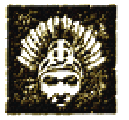
FOR an awful long time the screeching went on. And then suddenly it quit and there was a chorus of shouting. It came fainter than the screeching and it sounded like "Xipe! Xipe Teotl!"
I just stood and gawped at the Prof and, he at me. I don't know how long. As long as it was cold silent up there on the pyramid. Till there started up another steam whistle yell and more screeching all over again.
I snapped to some sort of sense. I grabbed the Prof by the arm and, "Let's get the hell outa this." I croaked. "The devil with whether we're weak or hurt and for gossakes let's go!"
And we upped and went. There was nobody to stop us; nor we weren't stopping. I've always sort of consoled myself that, while I never went to college, I was pretty sensible in an emergency. Our colonel allowed so too and that's what made me a sergeant. Sense would have been to hunt around for a gun or so that must be somewhere around the huts. But we weren't dawdling away time; we made for the jungle. Though I did have a thought to duck into a couple huts as we ran and pick up a machete and a banana leaf bundle that was grub.
We weren't so groggy on our feet that we couldn't navigate; and the going wasn't so hard as when we first came; the Indios had hacked their half a dozen or so paths as they gathered for the commando raid. We staggered along and we met nobody. Seemed like none of them had stopped even to hear about the doings. It was something nobody had better know about unless he belonged.
I didn't know where we were, but I knew that generally east and south would bring us somewhere to a coast. No picket fence of machetes to stop us. Silver Face hadn't been fooling. His cultists had to give their bloody old gods some more sacrifice and it didn't matter who was it.
With some chow tucked under our belts and a bit of rest by the way we got stronger as we went and we made some distance before night caught us. But it was easy enough to make a wickiup and crawl in; and if the jungle had been packed with varmints two to the square foot I'd have slept like dead.
Even I felt pretty cheerful with morning. That thing behind us was enough like a bad dream to be hazy in my waking mind; but I've dreamed it all over again plenty since. The Prof was the miracle. He was plumb slap-happy. Almost his old self. Cocky, I mean.
He said, "I could almost wish my subject had been early race migrations. A fascinating study. I must get in touch with this Churchward and discuss our findings that perhaps tend to substantiate his Lemurian theory; because those plaques were certainly Polynesian."
He couldn't fool me. I told him, "Don't camouflage with that baloney. I've been with you too long. That's not what you're so chipper about. What is it?"
And then he threw a scare into me worse than at any time we were being treated like fattened princes. He showed it to me. He fished out of his pocket a gruesome-looking gold mask; a thing about as big as his hand. A marvelous job of gold-smithy it was, certainly done by no savage with a stone chisel. It was Art. I don't know how the guy had done it, but the face looked like—like, migod, it hadn't any skin!
The Prof gloated over the beastly thing. He loved it. "Priceless," he said. "Beyond calculation, as the only specimen extant. It is Xipe the Skinless One."
"Where'd you get it?" I yelled; and I knew before he told me. I said before that an archaeologist would rob his sainted dying grandmother.
"The old priest had it," he said. "Mexicatl Teohuatzin. He wore it over his chest."
I couldn't tell him what I thought. I was having chills and a hemorrhage. But he could read it in my face.
"He gave it to me," he swore. "I felt it there and just before he died he bequeathed it to me."
"Like hell he did!" I choked through my closed throat. "In ancient Maya lingo, I suppose. But I'm not giving a hoot about how you got it. The hell is you've got it. You blasted fool, it's their sacred high priest's badge of office and they'll be after it on our trail like bloodhounds trained to catch their slaves dead. It's dynamite, you idiot! Throw it away. Up and let's get running."
For once he wasn't superior. He put up no argument about being told what a certified fool he was.
But he wouldn't throw it away. You might as well try to take away a virgin bone from a werewolf as an antique from an archaeologist. He clung to it. He insisted, "They won't follow us; they'll think the gang got it while they had the old man a prisoner. They will be searching in the huts and places; and what is more, they will be in a hurry to hide in the deep jungles after what they have done. And—Mexicatl gave it to me."
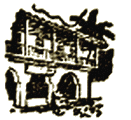
I DIDN'T argue, or even listen. I took a hold of him and dragged. I shoved. Down hill the trail went, down precipices. I just about beat him to keep him going and he came nearer to dying than ever under the gang's roughing-up tortures.
But damn if he wasn't right again. Nobody came after us. Or if they did, not till after we'd made the coast and got a fisherman's boat. The guy stared at us like we were ghosts and he told us we'd come out in Guatemala. And so we got away. Not that the Prof got away with his loot. I'd already told him he couldn't swipe ancient treasures out from under the Mexican Government, and Customs caught him.
And if you think this all a yarn I'll tell you what became of the "priceless treasure." It's in the Museo de Antiguedades in Oaxaca at this minute. In the room with the treasures from the ancient pyramid tombs of Monte Alban, the latest they've found, and so old that the científicos can't guess. In a case all by itself. Priceless. A guard watching it. But the mask isn't labeled from Monte Alban. It's just labeled; XIPE THE SKINLESS.
I've got no sympathy with the Prof. He got away from Xipe with his skin and he was lucky. And quite mad. He wants me to go with him to some caves I told him about where there's some idols and broken pots that the grave robbers haven't scratched up yet. Me? Ha! What I want is the peaceful life of an oil driller.
Roy Glashan's Library
Non sibi sed omnibus
Go to Home Page